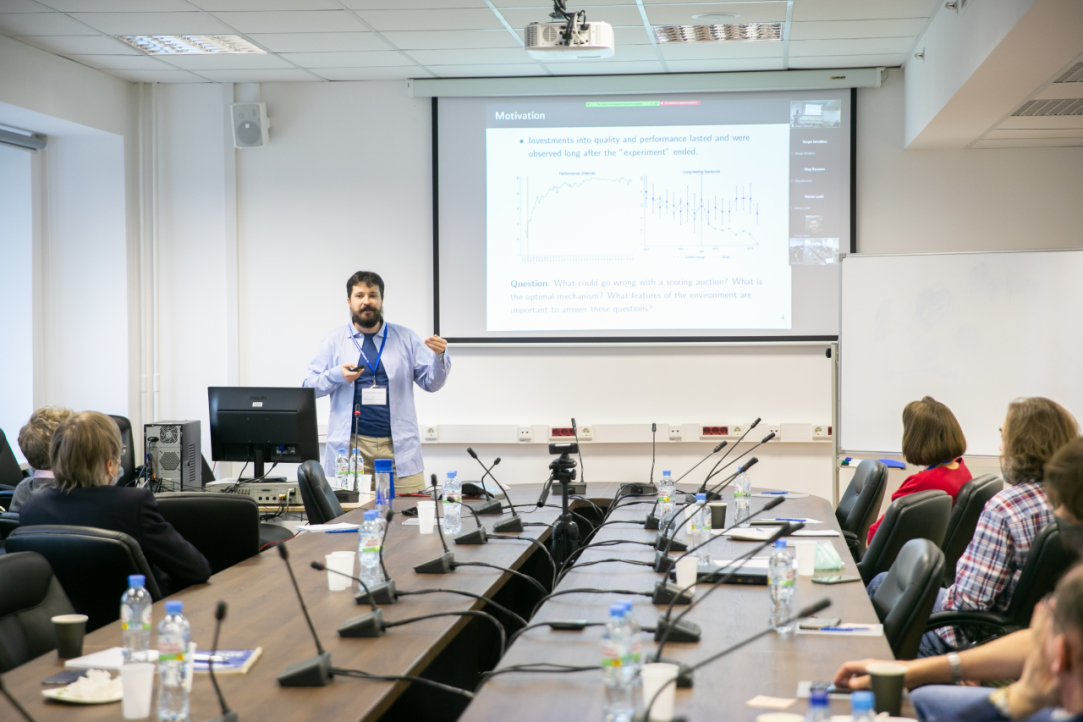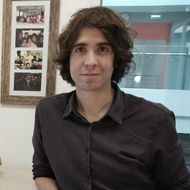"Face-to-face interaction is irreplaceable in academia": HSE and NES teamed up for Microeconomics Workshop

On October 14, ICEF HSE, HSE Faculty of Economic Sciences, and NES hosted a one-day, multiple-session workshop that featured the research being conducted by their scientists. A live streamed event held offline, the workshop proved another confirmation that digital services can never replace face-to-face communication.
Joint workshops are a popular practice with many universities and research centers that are geographically close and can therefore maintain regular exchange of ideas and experience, the examples being, among others, Stanford University and California Berkeley, Harvard and MIT. This year, HSE and NES started a series of joint workshops for scientists pursuing research in microeconomics.
The opening workshop was attended by researchers of HSE and NES and followed the mutually agreed agenda and academic training programme. With focus on microeconomic theory, it served as a venue for in-depth discussion of the current research projects.
A total of nine fresh research papers were presented, the majority yet to be published. Each speaker had a discussant representing one of the partner schools. “We chose microeconomic theory to be the topic for our opening workshop because this is what HSE and NES are particularly strong at,” says Maxim Nikitin, tenured professor, ICEF Deputy Director for Research.
Presentations were made by:
- Sergey Stepanov (HSE ICEF, HSE FES): Persuading Experts
- Danisz Okulicz (HSE ICEF, HSE FES): Matching agents to fighting clients
- Andrey Savochkin (NES): Time for Memorable Consumption
- Mikhail Drugov (NES): Optimal prizes in tournaments under nonseparable preferences
- Pavel Andreyanov (HSE FES): Scoring and Favoritism in Procurement
- Sergey Kovbasyuk (NES): Imposing Commitment to Rein in Overconfidence in Learning
- Tatiana Mayskaya (HSE ICEF, HSE FES)
- Ilya Krasikov (HSE FES): Screening with Hard Information
- Steven Kivinen (HSE ICEF): On the Manipulability of Equitable Voting Rules
Click here to read more about the presentations.
Tatiana Mayskaya, workshop participant, associate professor at ICEF

It was very important for us to use this time and meet offline. The workshop brought a breath of fresh air in our work after this lengthy academic isolation. Livestreaming helped those of the participants who couldn’t be there personally, for example, my co-author. Having a discussant for every presentation has been highly productive in terms of feedback – it benefitted my work greatly.
The workshop has brought together many experienced theorists of the two schools, NES and HSE. It inspired keen interest among us because its topic, microtheory, is what we all pursue in our research. I had a feeling I was in an international conference on the issues I explore.
Also, I can’t help but note the role of ICEF in organizing this workshop. Everything went smooth on the administrative side and with technical support and logistics, and also lunch, which was a great chance for us to network.
Peio Zuazo-Garin, workshop participant, associate professor at ICEF

The workshop participants presented some of their latest research efforts spanning several areas of the modern microeconomic theory such as mechanism design and information design, social choice theory or decision theory. This workshop can be called an initiative to voice important ideas and to fine-tune communication between scientists in different universities and their departments. I was amazed by the quality of the materials presented and I am sure that many of the papers will be approved for publication in leading scientific journals.
Notably, this workshop is one of the first events to have taken place offline (with some of its sessions live streamed) during the pandemic, which did stimulate verbal exchange and search for further research collaboration prospects. Personally, I met quite a number of colleagues when I joined ICEF team in 2020, who pursue a wide range of tasks also outside of ICEF. The face-to-face mode has highlighted the value of interpersonal communication in academia, both formal and informal, for a more creative academic climate.
Steven Kivinen
Danisz Okulicz
Peio Zuazo-Garin